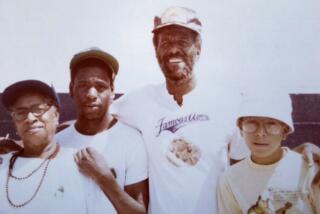Heard the One About the $250 Cookie Recipe?
- Share via
Fresh from a downtown Los Angeles bar, a sometime consumer gadfly arrived at The Times with a hot tip about yet another case of corporate callousness and greed.
Brandishing a photocopied letter, she claimed a famous department store, in a sneaky and underhanded manner, had charged an unsuspecting patron an outrageous sum for a recipe--the company’s popular chocolate chip cookie.
The actual victim was apparently an unnamed, but credible, Beverly Hills matron.
The single-page letter was full of indignation as it vividly described the incident and even contained exact dialogue of the transgression.
It began: “My daughter and I had finished a salad at Neiman-Marcus Cafe in Dallas and decided to have a small dessert. Because our family members are such ‘cookie monsters’ we decided to try the Neiman-Marcus Cookie. It was so excellent that I asked if they would give me the recipe, and they said with a small frown, ‘I’m afraid not.’ Well, I said, ‘Would you let me buy the recipe?’ With a cute smile she said, ‘Yes.’ I asked how much and she responded ‘two fifty.’ I said with approval, ‘Just add it to my tab,’ which I already signed.”
The letter continued: “Thirty days later I received my Visa statement from Neiman-Marcus and it was $285. I looked again, and I remembered I had only spent $9.95 for two salads and about $20 for a scarf. As I glanced at the bottom of the statement, it said, ‘Cookie Recipe--$250.00’ Boy, was I upset!”
The letter goes on to state that, in the spirit of revenge, the unnamed victim was providing to all interested parties the $250 recipe at no charge. Knowing a good story from the start, The Times made several unsuccessful attempts to discover the identity of the aggrieved Beverly Hills party. The story was eventually forgotten, as is normally the case when nothing checks out.
But then a respected Boston-based newspaper, the Christian Science Monitor, distributed an article throughout the country that retold the tale of the egregious recipe overcharge, with incredibly similar detail, adding a condemning, “fie upon Neiman Marcus.”
The cookie recipe caper thus got a new life.
Now, after a lengthy investigation, the facts are unearthed:
* Neiman Marcus does not sell recipes from its restaurants. The department store gives them away--free--to anyone who asks.
* There is no “Neiman Marcus Cafe” at any of the chain’s three Dallas-area stores. Instead, the restaurants are named Zodiac, Zodiac at North Park and The Woods.
* Neiman Marcus does not sell or serve cookies at any of its restaurants.
* There is no such thing as a “Neiman-Marcus Cookie.” (And Neiman Marcus no longer has a hyphen in its title.)
* Neiman Marcus does not take Visa. (The store does accept American Express.)
* The fashion cognoscenti would know immediately that you cannot buy a scarf at Neiman Marcus for $20, as the letter writer stated. Scarf prices start at $40 and quickly run to as high as $215.
How did this rumor get started?
Pat Zajac, Neiman Marcus spokesperson in Dallas, said that the tall tale has been circulating since she came to work for the chain in 1986. The first newspaper story she saw on the bogus cookie recipe appeared in 1988.
Zajac has said that in the past few weeks, her office has been swamped with calls from the media trying to verify the story. She speculates that the letter recently has been circulating on electronic mail services like some “computer virus.”
Needless to say, Neiman Marcus is not pleased with the rumor’s persistence or tone.
“We are concerned,” said Zajac. “We like to think we are accommodating to customers and provide value at a fair price and quality at the same time. We want to create good will. . . . No one has ever showed us a bill where they were wrongly charged (for a chocolate chip recipe). If they ever appear then we would be happy to look at the (disputed) charge.”
Zajac explained that Neiman Marcus, as one of the nation’s leading department stores, is proud of its customer service record and would quickly satisfy someone who had been incorrectly billed.
“The interesting thing in this phenomena is that no one ever knows the exact source of this letter. The information is anywhere between third- and 17th-hand information,” Zajac said. “There has never been a Neiman Marcus Chocolate Chip Cookie recipe that we sold for $250. Never.”
Ironically, Neiman Marcus has actually used its recipes to benefit the community. The company recently published a cookbook, “Pure & Simple,” that is a compilation of favorite recipes from its customers, famous and otherwise. Two dollars from the $19.95 sale price goes to charities designated by the book’s contributors. To date, $100,000 has been donated to groups such as the American Heart Assn., Zajac said. (For the record, there is no recipe for chocolate chip cookies in “Pure & Simple.”)
When it comes to signature dishes, Neiman Marcus is most famous for its Orange Souffle Ring and its Caramel Souffle Ring. (Anyone interested in getting a copy of these recipes--free of charge--can write to: Neiman Marcus Food Service Division, 1618 Main St., Dallas, Tex. 75201.)
The Neiman Marcus cookie caper is remarkably similar to another rumor that circulated several years ago about the recipe for Mrs. Fields’ Chocolate Chip Cookies. And veterans of the food world say the story formula goes back to the 1930s, when a similar tale was told about the Waldorf Astoria’s Red Velvet Cake.
A student of rumors, or urban myths, said that the Neiman Marcus incident meets many of the requirements for sustaining a bogus story.
“People who start rumors usually have a beef about something or other,” said Chaytor Mason, USC associate professor of human factors-psychology. “By starting a rumor (they hope) the target can be damaged, sometimes maliciously.”
Mason said that the subject of a rumor is usually famous or attractive. And while circulating a fiction via an anonymous letter is somewhat unusual, Mason said it makes sense because “generally we place more value and validity on anything we read.”
Two other loose ends remain in the Southern California version of the Neiman Marcus tale.
The Beverly Hills matron? The source for this particular embellishment said that she was actually “the friend of a friend of a relative” that got the recipe. When later told that the story was bogus, however, the source said that no one could actually find the person who claims to have experienced the recipe overcharge.
The sometime consumer gadfly? She’s back at the downtown Los Angeles watering hole, talking about some unusual brown cows in Georgia that give chocolate milk.
More to Read
Eat your way across L.A.
Get our weekly Tasting Notes newsletter for reviews, news and more.
You may occasionally receive promotional content from the Los Angeles Times.










